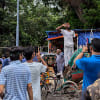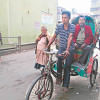Rickshaw pullers’ demands and our entrenched classism

On August 26, rickshaw pullers gathered en masse to block the Shahbagh intersection as a form of sit-in protest. Their demands were manifold, with one in particular—that of banning battery-run rickshaws—taking centre stage. From the outside, it seemed as if that was the entire procession. A demand for the ban on battery-run rickshaws that were posing an unfair competition, resulting in pedalled rickshaw pullers struggling to earn their daily keep.
To many on social media, this was the drama for the day, a "clash" between battery-run rickshaws and pedalled rickshaws. The situation on the internet soon devolved into mocking the protesters, labelling them as opportunists who were simply following the trend of making demands the same way HSC students and Ansar members had done before them. While some people debated the most prominent demand of banning battery-operated rickshaws, most looked at the whole situation with a touch of amusement.
While the exasperation of being met with one protesting group after another is perfectly understandable, the reaction here felt particularly tone-deaf and uninformed. The reason is obvious, but the classism on display is hidden under layers of internet irony aided by ignorance of the plights of these workers. Their rights, through the thunderous roar of internet humour, have been brushed aside—a fact made extremely ironic by the knowledge that mere weeks ago our battles were the same.
The 10 demands, they placed, require conversations since much of what they presented showcases their desire to not be swept aside and forgotten anymore.
The very first demand asks for state support for all the families of the martyred rickshaw pullers during the uprising that overthrew Sheikh Hasina's regime. The rickshaw pullers made a concentrated effort to remind us again that the working class have always been by our side—and that the lives they sacrificed cannot remain invisible.
The next three demands ask for increased state recognition, provision of government facilities, as well as restrictions on work hours, and control on entry into the rickshaw-pulling sector. Among these, the second official demand on the list is of particular importance, as the demand references US labour policy and asks rickshaw pullers to be placed as top-priority labour workers in accordance to said policies.
Numerous talking points arose from this particular demand. Questions are being asked as to how rickshaw pullers came to know of US labour policies. Yet again we find ourselves having to combat the classism we have internalised. Make no mistake, the working-class people are often not in the underprivileged states that they are due to a lack of education. Often, it is the circumstances and the systems run by the current political powers that make them take up the rickshaw-pulling job. To assume they are incapable of possessing knowledge further removes them from the personhood they are currently fighting for—and that is something we as a collective can do better to remember.
The fourth demand, which states that there needs to be controlled entry into the sector, has also raised some eyebrows. This demand, in particular, suffers from a lack of clarity, as different groups have taken it to mean different things. Many fear that exercising control would result in having a high barrier of entry, which would result in new people being disallowed to work as rickshaw pullers, something which is already a last resort for many. Others fear that syndicates would take over, resulting in further diminished rights for the workers. The details of this demand remain hazy, and without further clarification from the protesters, not much can be said about it.
Demand number five asks for support of elderly rickshaw pullers, something that should not require any debate. Demands six and seven ask for fair treatment, such as parking facilities on street corners and stopping abuse by police officers. Providing parking services is something many have gripes against. However, I will argue that as a country that very strongly depends on rickshaw pullers daily, we are not likely to get rid of them anytime soon. As such, does it not make sense to legitimise their parking spaces? It's clear that without spaces such as these, rickshaw pullers are bound to create traffic congestion by parking their vehicles in unauthorised spaces.
Demand number eight is the one that ultimately turned the most heads. The demand does not outright ask for a ban on battery-run rickshaws but asks for these rickshaws to return to their previously designated areas.
There are multiple valid reasons behind this demand, but it's also difficult to look past the inhumane nature of pedalled rickshaws. From an outsider's perspective, I am inclined to say that a slow but steady transition of all pedalled rickshaws being converted to battery-operated ones with strict regulations would be the best outcome. As things stand right now, a way forward from this feels difficult, and creating a divide between different types of rickshaw pullers further exacerbates the problem of the rest of their demands not being taken seriously.
Demand number nine is, once again, a straight-forward request to fix the left side of the road, which is the side where rickshaws most frequently make their lane. However, demand number 10—which asks for rickshaw pullers to be consulted and allowed to participate in the country's reformation—has raised several questions. Once again, it cannot be overstated that rickshaw pullers have been one of the earliest and most vocal allies in our effort to overthrow the previous regime, they have provided free rides to injured students and have stood with them on protests, chanting side by side against the oppression they all faced. To not allow them to have a say in the country's reformation would take us back to square one, where the workers return to having little to no rights. In the end, what would they have fought for? Just for things to stay the same?
Finally, several sides have decided to raise questions such as, "Why now?" or "Why not take this up officially instead of blocking roads?" The premise for both of these questions is slightly, if not entirely, skewed. We are already beginning to forget the role rickshaw pullers played in our movement, and if not now, then there would simply be no other time to raise this issue and make their demands. The bottom line, thus, remains that the voices of those who serve as the backbone of our country should not, under any circumstance, be left unheard.
Raian Abedin is final-year undergraduate student at North South University and a contributor for The Daily Star Campus and Star Books and Literature.
Views expressed in this article are the author's own.
Follow The Daily Star Opinion on Facebook for the latest opinions, commentaries and analyses by experts and professionals. To contribute your article or letter to The Daily Star Opinion, see our guidelines for submission.

 For all latest news, follow The Daily Star's Google News channel.
For all latest news, follow The Daily Star's Google News channel. 








Comments